The quantum computing It is a branch of computing that attempts to use the properties of quantum physics to process information more efficiently than conventional computers.
Unlike classical computers, which use bits to process information, quantum computers use qubits, which are quantum particles that can have more than two states.
The ability of qubits to exist in multiple states simultaneously is known as quantum superposition, which allows quantum computers to process large amounts of information simultaneously.
Additionally, qubits can also be entangled, meaning that the measurement of one qubit can affect the state of another qubit, allowing operations to be performed in parallel.

Variety of applications
The quantum computing It is used in various applications, such as quantum cryptography, simulation of complex quantum systems, system optimization, and large database searches.
The quantum cryptography It is used to protect communications and financial transactions because the quantum nature of qubits makes it impossible for third parties to intercept information without being detected.
The quantum computing It also has the potential to revolutionize the artificial intelligence industry.
Quantum computers are capable of processing large amounts of data and performing complex calculations in parallel, which can greatly improve the efficiency and accuracy of machine learning models.
Despite the advances in quantum computing, there are still many technical challenges that need to be overcome before this technology can become a practical tool in the real world.
One of the biggest challenges is quantum error correction, as qubits are very sensitive to errors due to the quantum nature of their state.
Furthermore, quantum computers are still very expensive and difficult to build and maintain.
Quantum computing is an exciting and constantly evolving field that has the potential to change the way we process information.
As technical challenges are overcome and new applications for quantum technologies are developed, we are likely to see increased adoption of quantum computers across a range of sectors.
A promising future
Or future of quantum computing It is very promising and this technology is expected to have a significant impact in many areas, from science and research to industry and the economy.
An area in which the quantum computing have a big impact is cryptography.
As quantum computers become more powerful, so do cryptographic techniques that can break current security algorithms.
Quantum cryptography could be the solution to this problem, since quantum security systems are theoretically untouchable.
Quantum computing also has the potential to greatly accelerate scientific research.
For example, quantum computers can simulate complex quantum systems that would be impossible to simulate on a classical computer.
This could have important applications in fields such as chemistry, materials physics and biology, allowing scientists to make important discoveries more quickly.
Conclusion
The quantum computing It can also have a great impact on the field of artificial intelligence.
Machine learning models are very computationally intensive and can take a long time to run on a regular computer.
Quantum computers can greatly accelerate this process and allow the training of more complex and accurate models.
As the quantum technology As it continues to evolve, we are likely to see an increase in research and development of quantum applications in various sectors.
As technical challenges are overcome and new applications are developed, it is likely that Quantum computing will have an increasing impact on the way we process information and meet the challenges of the modern world.
